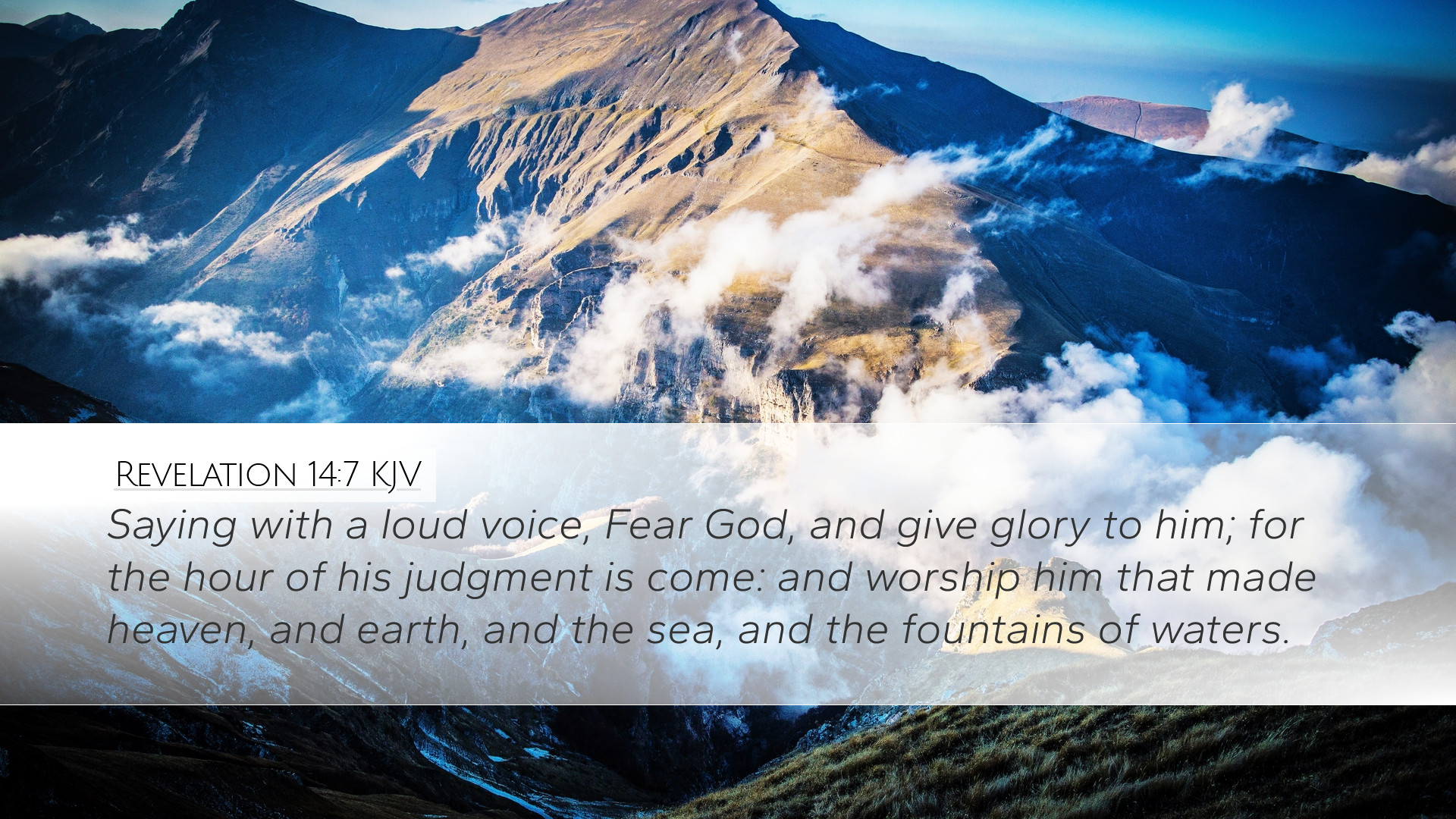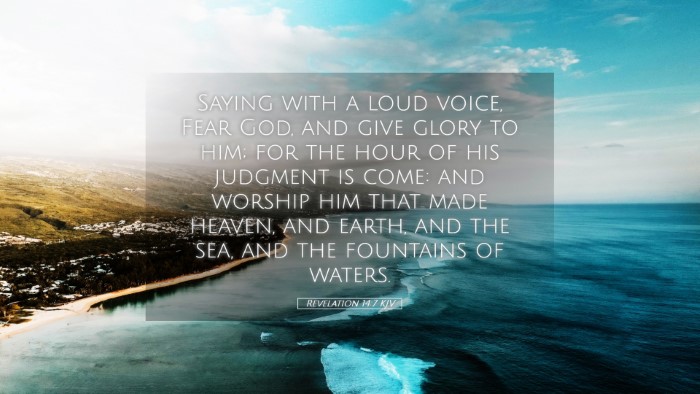Bible Commentary on Revelation 14:7
Revelation 14:7 states: "Saying with a loud voice, Fear God, and give glory to him; for the hour of his judgment is come: and worship him that made heaven, and earth, and the sea, and the fountains of waters."
Introduction
This verse encapsulates profound theological implications regarding the nature of God, the urgency of His judgment, and the obligation of humanity to respond in worship and reverence. Various esteemed Bible commentators provide illuminating insights that help unpack its meaning.
Contextual Background
In the Book of Revelation, John captures visions revealing the ultimate victory of Christ over evil, the reality of divine judgment, and the declaration of eternal truth. Revelation 14 occupies a pivotal position where a series of proclamations highlight the necessity of worshiping the Creator amidst impending judgment.
Key Themes in Revelation 14:7
- The Fear of God: The command to "Fear God" speaks to the reverence and awe that believers ought to have towards God.
- Giving Glory to God: This emphasizes recognizing and to praise God's supremacy and sovereignty.
- The Coming Judgment: The phrase "for the hour of his judgment is come" reveals the urgency and immediacy of God's impending judgment.
- Worship of the Creator: The call to worship Him who made the universe affirms God's role as the ultimate sovereign creator.
Commentary Insights
Matthew Henry's Exposition
Matthew Henry highlights the crucial nature of revering God. He states that "the fear of God is the beginning of wisdom," which underscores the necessity of understanding our place in the divine order. Thus, the fear mentioned here is not one of terror but one that is rooted in love, respect, and awe for God’s majesty.
Henry advocates for both personal and collective recognition of God’s glory, urging believers to live in a manner that expresses gratitude and honor towards Him. He views the warning of impending judgment as an invitation to repentance, emphasizing how the acknowledgment of God's righteousness should stir a fresh zeal for worship among the faithful.
Albert Barnes' Observations
Albert Barnes elaborates on the urgency of the message, indicating that the declaration of judgment serves as a descriptor of God's sovereignty over creation. He points out that this proclamation should awaken a sense of accountability among believers, prompting them to examine their lives in light of God's impending judgment.
Barnes further affirms that worship must transcend mere ritual; it must be characterized by sincerity and a deep understanding of who God is. By stating, "worship him that made heaven, and earth," it serves as a reminder of the creator’s powerful authority over all existence, thus evoking an intrinsic reverence in the hearts of believers.
Adam Clarke's Reflections
Adam Clarke offers a profound insight regarding the necessity of worship in the context of divine judgment. He notes that genuine worship encompasses more than expression; it is about aligning one's entire being with the purpose and will of God. Clarke emphasizes that this worship is not limited to verbal expressions but extends into tangible acts of obedience and service to God.
Clarke also draws attention to the significance of “the fountains of waters,” illustrating creation's beauty and the life-giving providence of God. He argues that recognizing God as the ultimate source of all blessings calls for a lifestyle steeped in gratitude and active worship.
Theological Implications
The exhortation present in Revelation 14:7 invites deeper theological inquiry into the nature of God’s judgment and sovereignty. The fear of God is foundational to the Christian faith, as it encapsulates the principle that the Creator is both just and merciful.
Moreover, true worship integrates the entirety of a believer's life in acknowledgment of God’s glory. The call to worship serves as a reminder that mankind's primary purpose resonates in glorifying the Creator, transforming every facet of life into an act of worship.
Applications for Believers
The practical application of this verse is significant for pastors, students, theologians, and scholars alike:
- Embrace Godly Fear: Believers must cultivate a healthy fear of God that fosters awe and respect, leading to personal holiness.
- Live for God’s Glory: Every action must be driven by the desire to glorify God, encouraging introspection on whether daily activities reflect His glory.
- Understand Judgment: An awareness of God’s judgment should motivate believers to share the Gospel fervently, seeking to reconcile others to God.
- Commit to Worship: Cultivating a lifestyle of worship through devotion, prayer, and acts of service that honor the Creator.
Conclusion
Revelation 14:7 serves as a powerful reminder of the character of God and the imperative of faithful worship in anticipation of His righteous judgment. Through the insights of Matthew Henry, Albert Barnes, and Adam Clarke, believers are encouraged to deepen their fear of God, recognize His glory, and live lives of worship dedicated to fulfilling the divine mandate of honoring the Creator and Savior at all times. This verse continues to remind Christians of their ultimate purpose in a world fraught with distractions: to fear God, give glory to Him, and worship with all of their heart, soul, mind, and strength.


